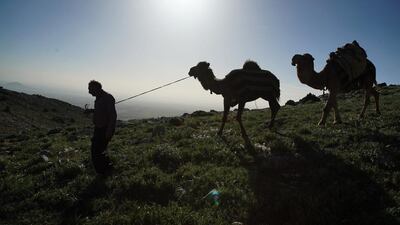KARAMAN // Every spring Hasan Bacak, his wife, Emine, and their 1-year old son, Mehmet, migrate for weeks in search of higher ground for their livestock to graze. Theirs is a simple life shaped by the tempo of the seasons.
They’re members of the Sarikecili, an indigenous nomad group in southern Turkey that moves every summer from the Mediterranean coast to the Anatolian mountains with their herds, chasing cooler climates as temperatures rise near the shore and become too oppressive for their animals. With 14 camels and about 250 goats, the family navigates rough terrain, tracing an ancient route forged by their forefathers.
But climate change is altering the course and speed of their annual journey. There isn’t enough rainfall in the winter, so where years ago they stayed for days on end in on one spot, they now have to keep moving on a daily basis.
“Every year here, the length of the herb used to be like that,” says Hasan Bacak, gesturing to a small bush. “This year it’s not. It’s dry, because there is no rain. If there had been rain, there would have been herbs here this year. We would have stayed three days here.”
Mikdat Kadioglu, professor of meteorology engineering at Istanbul Technical University, says winters are now warmer and there’s less rain then to help things grow.
Hasan, who was born in these mountains, has been a nomad his whole life and witnessed the changes firsthand.
“Before there used to be snow here, we used to eat snow,” he said. “Now, there is no snow for two years.”
Ayse Hilal Tuztas, an anthropologist who carried out research on the Sarakecili, says there are around 150 families – about 800 to 1,000 people – left in Turkey who still live this traditional lifestyle.
“Their life depends on water and rain,” she says. “Climate change is affecting the precipitation negatively. And of course, this negative effect is also affecting the continuation of the nomad life.”
Every day, after a breakfast of bread and goat cheese, Hasan readies the camels, while his wife sets off with the goats, cutting a path across a jagged landscape.
Packing up every day takes a toll, especially with a baby, he says.
“We were more comfortable before. I remember that we used to stay here for a week. But now, I arrived yesterday, I am leaving today. There is no green, the cattle don’t stop.”
* Associated Press

